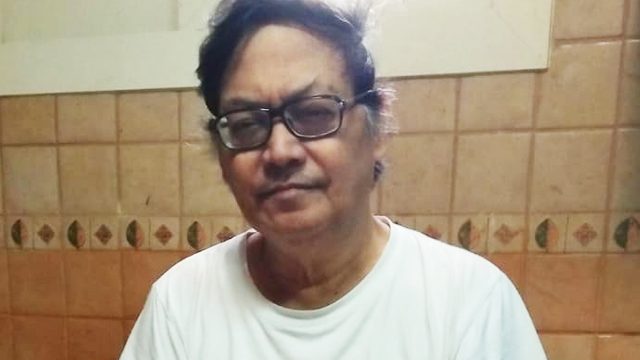SUMMARY
This is AI generated summarization, which may have errors. For context, always refer to the full article.

DUBAI, United Arab Emirates – A 71-year-old engineer who has spent his life working in the Middle East is now penniless, wheelchair-bound with a debilitating medical condition, and could not as yet go home to the Philippines to join his family because of a bank loan that has accrued to some 150,000 dirhams (around P2.035 million)* over time.
Eduardo Malinao Cervantes, who hails from Quezon province and lives in a shared accommodation in Abu Hail north of Dubai, has diabetes that has worsened and caused glaucoma. He also has cataract.
“Noong nakaraang week, tuluyan na akong hindi makakita (Last week, I have completely lost sight),” said Cervantes.
“Inaalalayan na lang ko ng mga kasamahan ko dito sa bahay sa pagkain at paglalakad (The people I live with help me in eating and walking),” he added.
Cervantes arrived in Saudi Arabia back in 1983 to work as a communications engineer. He stayed there for 20 years until 2003, when he was transferred by the company to Dubai for a project. He said he used to work at General Motors Philippines before he went abroad.
Cervantes said that around 2008, he decided to apply for a Dh70,000 (around P949,000) loan from a private bank in Dubai to consolidate his credit card debts. He said he had up to 5 credit cards. (READ: The OFW debt trap: Less money, more problems)
“Nagawa ko lang mangutang ng malakihan sa banko kasi may mga credit cards ako na gusto ko nang isara (I only took out a bank loan because I had credit card accounts that I already wanted to close),” said Cervantes.
He became delinquent with his payments around 2009, which consequently caused interest to pile up, prompting the bank to seek the services of a collection agency to go after him. He lost his job in the same year as he was not able to renew his residency visa because of the debt case.
A criminal case was filed against him in December 2009, for which he served a monthlong jail time in January 2010.
Travel ban
In mid-2011, a civil case was filed against him, which he went to jail for more than a year. He learned that a travel ban has been imposed on him when he got out of prison in 2012.
Cervantes said the Philippine Consulate’s Assistance to Nationals (ATN) section has been working on his case and appealing that the travel ban imposed on him be lifted on humanitarian grounds. His passport is with the Dubai Court.
“Natulungan naman nila ako kaya lang nagkaroon ng problema kasi kailangan kong maibigay ‘yung amount na hinihingi ng banko through a collection agency,” he said.
(They were able to help me, but there’s still a problem because I have to pay the amount that the bank is asking for through a collection agency.)
Marco Flores, ATN case officer, said they have referred Cervantes’ case to the Department of Foreign Affairs’ (DFA) home office in Manila.
“‘Yung report po niyan napadala na po namin before pa po sa DFA Office of the Undersecretary for Migrant Workers’ Affairs. At hindi pa siya makakauwi po since may travel ban po siya which is aware naman din po si Tatay,” Flores said.
(We already sent that report before to the Office of the Undersecretary for Migrant Workers’ Affairs. And he can’t go home since there’s a travel ban imposed on him which he is aware of.)
Asked how many credit card problems the consulate has on its desk, Flores said: “Marami po. Hindi na po namin mabilang (There are many. We’ve lost count).“
Failure to meet credit card obligations is among the leading problems besetting overseas Filipino workers (OFWs) in the UAE who have come up with the phrase “Ikaskas mo lang (Just swipe it)” whenever they needed or wanted to buy something for themselves or loved ones back home. This, especially during sale events for branded clothes, accessories, and gadgets, of which there has never been a shortage in Dubai.
Lawyer Barney Almazar, an OFW advocate and a director at Dubai-based Gulf Law Consultancy, said the number one legal concern in the UAE is police and civil cases from unpaid loans.
“This month, we have about 200 inquiries and requests for assistance to settle their loan obligations. The best solution is to negotiate with the banks taking into consideration both their personal circumstances and central bank regulations to strengthen their bargaining position. We can also use humanitarian grounds to get some concessions,” he said.
‘Gusto na niyang makauwi’
Cervantes said he managed to save money in the Philippines when he was still gainfully employed.
“Kaya lang naubos na kasi hindi na ako nakapagpapadala dahil nagbabayad ng utang at wala nang trabaho,” he said. (READ: The hanging fate of OFWs buried in debt)
(But it’s all gone; I stopped sending money back home because I was paying off debts and was out of work.)
According to Gracie May Kalaw, who was among Cervantes’ friends providing support, his US-based older sister has been sending financial help through the years.
“Food and housing were through his friends,” Kalaw said.
These days, Kalaw said, all that Cervantes wants is to go home. He has two children and a grandchild.
“Gustong-gusto na niyang makauwi (He really wants to go home),” she said. – Rappler.com
*Dh1 = P13.5731
Add a comment
How does this make you feel?
There are no comments yet. Add your comment to start the conversation.